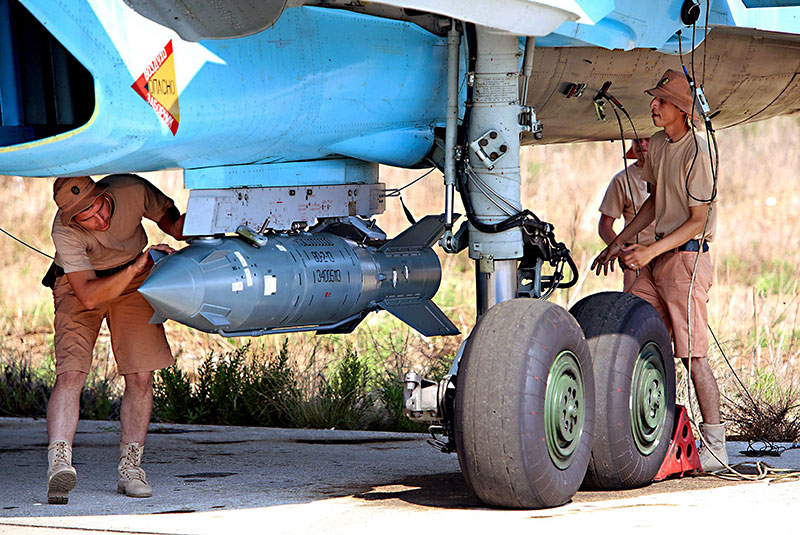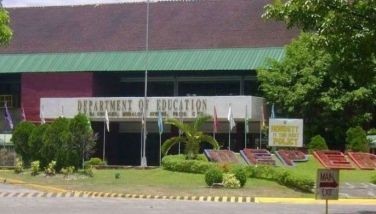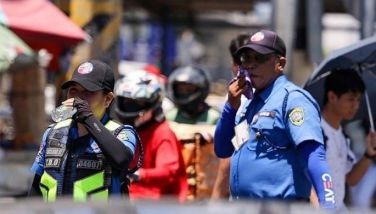Rody wants Russian precision bombs

Soldiers prepare a Russian-made KAB-500S precision-guided munition in an image posted on Russia Today. The satellite-guided KAB-500S bombs have been used in Russian strikes against the Islamic State in Syria.
DAVAO CITY , Philippines – If there is one thing that President Duterte wants when he leaves today for an official visit to Russia, it is to obtain precision-guided munitions for use against Islamic State-inspired terrorist groups.
The President lamented that bombs of the Armed Forces are not as accurate as the ones guided by laser or satellites like those of Russia.
“It is difficult for us. So we have this ISIS thing. I’ve been scouting around for (a weapon to finish them off)… I’m going to Russia. Same purpose. If they can spare us the precision-guided (bombs)… we have so many smart bombs but not as accurate as the ones guided by laser or satellite,” Duterte told participants in the Philippine Coast Guard Auxillary national convention held here over the weekend.
Duterte will leave for Russia for a four-day landmark visit in line with his commitment to pursue an independent foreign policy.
Agreements on security, legal assistance and trade are expected to be signed during the May 23 to 26 visit, which officials said, would mark a new chapter in ties between Manila and Moscow.
The strengthening of defense cooperation between the Philippines and Russia is among the primary agenda of Duterte’s visit to Moscow.
Duterte will also meet with Russia Prime Minister Dmitry Medvedev and President Vladimir Putin on May 24 and 25 to discuss key issues and ways to strengthen political, military and economic cooperation.
Dumb getting smarter
Duterte lamented the bombs being used by the military against extremist groups in Mindanao are not as accurate, causing collateral damage in the deaths of civilians and non-combatants.
The President was referring to the iron or “dumb” bombs dropped from an aircraft and guided merely by gravity as against the “smart” bombs guided by laser or satellite to its target.
“We have the dumb bombs which will just… leave unintended consequences such as killing of civilians, which we are really trying to not to use because it could cause so many collateral damage,” he said.
Duterte took notice of the surgical strikes by Russia against the IS militants in Syria.
The Russians use bombs that are guided by a weapon system operator, or the pilot, to hone in on a target with less probable damage to civilians and non-combatants in the area.
The weapon used by the Russians against the IS in Syria is the KAB guided bomb, which comes with the variants KAB-250 and KAB-500.
The Russians use the KAB-500 that drops from a Sukhoi fighter/bomber from an altitude of 5,000 meters. Even from that altitude, the bomb is guided to its target through its Global Satellite Navigation System (GLONASS).
The state-sponsored Russia Today (RT) described the bomb as weighing 500 kilograms and measures three meters in length. Its payload has 380 kilograms of high explosive.
The Russian guided bombs, however, must be fitted to an aircraft designed to accommodate the bomb on its bay to allow the weapon to drop precisely on target.
Experts said using precision-guided munitions is more expensive than the traditional gravity bombs.
Some analysts said Russia has been trying to show to the world that it is more practical and economical to use laser-guided bombs, such as in its campaign against IS in Syria.
Military experts however believe Russia’s intervention in Syria is getting expensive to maintain.
Duterte has repeatedly talked about the offer of Russia to supply the Philippines with high-powered weapons at a cheaper price and even on a “buy one, take one” basis.
He stressed the Philippines would explore possible cooperation in defense with Russia although it would not necessarily mean the forging of a defense treaty with Moscow.
Foreign Affairs Assistant Secretary Maria Cleofe Natividad said there would be several agreements signed during the visit, including at the meeting between Duterte and Putin.
The two leaders will witness the signing of agreements related to defense cooperation, military and technical cooperation, the treaty on mutual legal assistance in criminal matters, treaty on extradition, a memorandum of understanding on cooperation in the field of security between respective national security councils.
Natividad said the agreement on military technical cooperation would pave the way for the Philippines to explore possible military procurement from Russia.
It would also be a way for Russia to participate in the defense modernization program of the Philippines.
Defense Secretary Delfin Lorenzana, who visited Moscow last December, had said the Philippines is looking for partnerships with countries it can get the best deals with and also ones most compatible with the defense needs of the military.
Natividad added the defense cooperation with Russia would cover greater opportunities for consultation and cooperation in security-related matters, both traditional and non-traditional.
“And for defense cooperation, we look forward to having greater exchanges in terms of views on how to approach security challenges and we also look forward to strengthening our presence in terms of the defense offices both in Moscow and here in Manila,” Natividad said.
She said the Philippines is looking forward to the opening of an Office of Defense Attaché in Moscow while the Russian government will also be opening a defense office in Manila.
Natividad said the opening of defense attaché offices in Manila and Moscow is aimed at further strengthening the partnership in approaching both traditional and non-traditional security matters such as terrorism, cooperation in anti-terrorism efforts, cooperation against illegal drugs and trafficking.
The increasing interest in the defense cooperation has been shown with the visits of Russian warships to the Philippines twice this year.
“So it is more into that aspect of becoming more familiar with each other’s competence that we are looking at and there is no discussion at the moment in terms of, you know, joint exercises, our status in the visiting forces,” Natividad said.
She said the Philippines welcomes Russia’s greater participation and involvement in the Asia-Pacific region. After all they are already very much engaged in the region through their participation in ASEAN and in the Asia-Pacific Economic Cooperation (APEC).
Aside from the discussions on defense cooperation with Moscow, Duterte will also make a pitch before Russian businessmen to invest in the country and boost economic and trade cooperation.
Duterte will also work on luring Russian tourists to the Philippines.
There have only been about 38,000 Russian tourists who visited the country last year.
Diplomatic ties between the Philippines and the Russia actually span almost 41 years but Natividad described it to be still at a “nascent” stage.
Linchpin
The visit will not be the first time the Philippine President will meet with the Russian leaders.
Duterte had a bilateral meeting with Medvedev on the sidelines of the ASEAN summit in Laos last September. He also met with Putin during the APEC meet in Peru last November.
During his meeting with Putin, Duterte slammed what he called the “hypocrisy” of the US and other western countries and their supposed bullying of smaller nations. Duterte then claimed that he and Putin have become “fast friends.”
Some experts believe the relationship between the Philippines, which has veered away from excessive dependence on the US, and Russia has the potential to grow.
In an address delivered in Moscow in 2014, Carlos Sorreta, then director of the Philippine Foreign Service Institute, said Russia is now seeking cooperation and active participation in East Asia. The strategy was highlighted by Russia’s hosting of APEC in Vladivostok in 2012, he added.
Sorreta noted members of the ASEAN, which he described as a “child of the Cold War, born and bred with the objective of halting the spread of communism,” had stood on opposite sides during the Cold War.
“This time around, Russia is not attempting to assert itself in the region through power and ideology. The preferred path is cooperation and active participation in the vibrant markets of East Asia,” he said.
In an article published on the website The Diplomat, journalist Samuel Ramani said Russian policymakers have started to view the Philippines as a “linchpin in their strategy to economically engage the ASEAN bloc.” The change in perspective has been triggered by the Philippines’ economic vibrancy in recent years, Ramani added.
Citing Russian analysts, Ramani said the Philippines could be key in Moscow’s ambition to forge a free trade agreement between the Eurasian Economic Union and ASEAN.
In an article posted on Russia Beyond the Headlines, New Zealand-based journalist and foreign affairs analyst Rakesh Simha said Filipinos appreciate that Russia is building its relations with Southeast Asia on an ideology-free basis.
Simha noted Russia is not taking sides in the South China Sea dispute and that it is not antagonistic in nature.
“Russia is applying pressure in the Pacific in order to offset Western pressure in Ukraine and Eastern Europe. But in the ASEAN region, Russia is more interested in commerce and influence rather than geopolitical maneuvers. So Moscow will not side with China against the others in Southeast Asia,” Simha said.
Officials are hopeful that Duterte’s visit could lead to stronger ties with Russia, which one official described as “cordial albeit modest in scope and depth.”
“We consider this visit as a landmark that will send a strong message of the Philippines’ commitment to seek new partnerships and strengthen relations with non-traditional partners such as Russia,” Natividad said in a press briefing last Friday. – With Alexis Romero
- Latest
- Trending
































